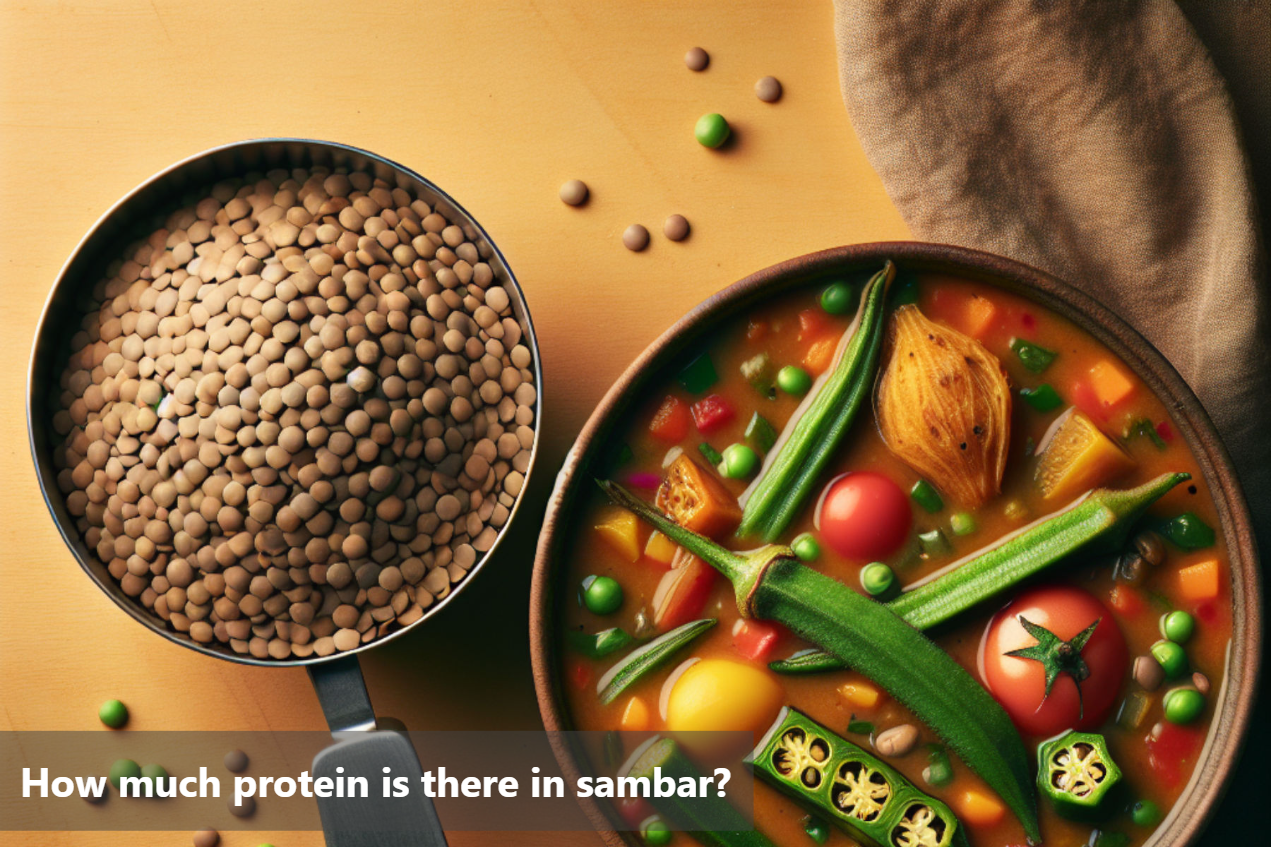
How much protein is there in sambar?
Sambar is a traditional South Indian dish known for its rich flavors and nutritious ingredients. Made with a combination of lentils, vegetables, tamarind, and a unique blend of spices, sambar offers a burst of flavors with every spoonful. This iconic dish holds a special place in South Indian cuisine, often served alongside steamed rice, idli, dosa, or vada.
The protein content in sambar primarily comes from the lentils used in its preparation. Lentils are an excellent plant-based source of protein, making sambar a popular choice for vegetarians and vegans looking to meet their protein needs. Additionally, the inclusion of vegetables such as okra, carrots, and eggplant not only enhances the nutritional profile of sambar but also adds a variety of vitamins and minerals to the dish.
As a protein-rich dish, sambar offers a wholesome and satisfying meal option for individuals looking to include more plant-based proteins in their diet. Its versatility and delicious taste make it a favorite among those seeking a flavorful and nutritious addition to their daily meals.

Nutritional Profile of Sambar
Sambar (1 cup) |
Nutritional Value |
1 bowl sambar calories |
130 |
Carbs |
26 g |
Fat |
0.7 g |
Protein |
7.1 g |
Sodium |
202 mg |
Potassium |
527 mg |
Iron |
17% |
Calcium |
5% |
Vitamin A |
23% |
Vitamin C |
57% |
Factors affecting protein content in sambar
Type and Amount of Lentils: The primary source of protein in sambar is lentils (typically toor dal or pigeon peas). The protein content can vary based on the type of lentils used and the quantity added to the recipe.
Protein-rich Ingredients: Apart from lentils, sambar often includes other protein-rich ingredients such as vegetables (like drumsticks, carrots, beans, or potatoes), which can contribute to the overall protein content.
Spices and Seasonings: Some spices and seasonings added to sambar, such as mustard seeds, fenugreek seeds, and curry leaves, may contain trace amounts of protein, albeit not significant enough to substantially affect the overall protein content.
Tamarind or Tomato Paste: These ingredients are commonly used in sambar for sourness and flavor. While they don't contribute much protein, their presence can slightly dilute the protein content per serving.
Cooking Methods: The method of cooking, such as pressure cooking or slow simmering, can affect the retention of nutrients, including proteins, in the ingredients used to make sambar.
Addition of Protein Enhancers: Some recipes may include protein enhancers like powdered peanuts or coconut, which can boost the protein content of the sambar.
Portion Size and Serving: The protein content of a serving of sambar will ultimately depend on the portion size consumed.
Variations in Recipes: Different regions and households have their own variations of sambar, which may include additional protein-rich ingredients or different proportions of lentils and vegetables, resulting in variations in protein content.
Health Benefits
Rich Source of Protein: Sambar is made with lentils (typically toor dal), which are a rich source of plant-based protein, essential for muscle growth, repair, and overall body function.
Promotes Heart Health: The fiber, potassium, and antioxidants in sambar help regulate blood pressure, lower cholesterol levels, and reduce the risk of heart disease and stroke.
Supports Weight Management: The high fiber content in sambar helps promote satiety, preventing overeating and aiding in weight management.
Blood Sugar Regulation: The low glycemic index of lentils and vegetables in sambar helps regulate blood sugar levels, making it a suitable choice for individuals with diabetes when consumed in moderation.
Boosts Immunity: The vitamins, minerals, and antioxidants in sambar support a healthy immune system, helping the body fight off infections and illnesses.
Digestive Health: The spices and herbs used in sambar, such as cumin seeds, turmeric, and asafoetida, have digestive properties that aid in digestion and alleviate digestive discomfort.

Protein in Sambar unveiled
Sambar, a traditional South Indian dish, not only tantalizes the taste buds but also packs a powerful punch in terms of nutritional value. Rich in protein, thanks to the variety of ingredients like lentils, vegetables, and spices, sambar stands out as a protein powerhouse in a balanced diet.
When we talk about protein in sambar, we are looking at a combination of essential amino acids that are crucial for muscle health and overall well-being. The lentils and vegetables present in sambar provide a plant-based source of protein, making it a favorable option for vegetarians and vegans looking to meet their protein requirements.
Thus, sambar emerges as not just a flavorful culinary delight but also as a valuable addition to a well-rounded diet. Its protein-rich composition makes it a must-have dish for those seeking a healthy, balanced lifestyle.
FAQs
-
How much protein is there in sambar?
Sambar typically contains about 10-12 grams of protein per serving.
-
Is sambar a good source of protein?
Yes, sambar is considered a good source of protein, especially when made with ingredients like lentils and vegetables.
-
Can I increase the protein content in sambar?
Yes, you can increase the protein content by adding more lentils or legumes like chickpeas or tofu.
-
Is sambar suitable for vegetarians looking to increase protein intake?
Yes, sambar is an excellent option for vegetarians seeking to add more protein to their diet.
-
Are there any variations of sambar that are higher in protein?
You can try adding ingredients like sprouted beans or quinoa to enhance the protein content in your sambar.
This Blog post is an initiative by Lo! Foods, to provide accurate and Nutritionist / Doctor approved information related to Health. Lo! Foods is India's leading brand for Everyday Functional Foods. Foods designed for specific Health conditions or Needs. Lo! Foods also runs India's largest range of Low Carb Healthy Cloud Kitchens, under the brand names of Lo!, ProteinChef, ATH (All Things Healthy) and DiabeSmart.















Leave a comment
Your email address will not be published.